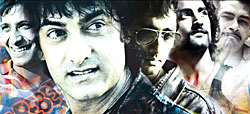 The run of anti-Pakistan films out of Bollywood peaked a few years ago with productions like the infamous Gadar, which seem like a bad memory today-like Kargil.
The run of anti-Pakistan films out of Bollywood peaked a few years ago with productions like the infamous Gadar, which seem like a bad memory today-like Kargil. As the Hindi film market expands and ropes in the upper as well as expatriate classes, more complex themes are being addressed. The release last month of Rang de Basanti starring Aamir Khan confirms this trend and it challenges the introverted, nihilistic worldview of the English-speaking college youth of India/Southasia.
The story is about a fun-loving band of Delhi University students whose members revel in drinking beer and exchanging smart one-liners. Their attitude towards politicians and public service drips with self-serving cynicism, until a rookie filmmaker from London comes by and ropes them into acting in an amateur production about martyred fighters of the Indian freedom struggle. So far so good and the larger portion of the film by Rakyesh Omprakash Mehra is devoted to the self-discovery of these spoilt brats.
The film draws a parallel-in sepia and Technicolor-between the militancy of Bhagat Singh and his hardy band against the British colonials back in the 1920s and the Delhi youngsters becoming conscious of their societal responsibilities. But then the comparison is taken literally too far and that is where Rang de Basanti turns dangerous because of its immaturity and illogic.
Bhagat Singh went about assassinating colonial administrators in a freedom struggle and Mehra astonishes by having his modern-day protagonists stalk and murder a minister guilty of corruption in a military deal. The kids then hole up in the studios of All India Radio and are picked off one by one by commandos, which again projects an image of a police state at the Indian centre that seems ingenuous and out-of-whack.
This departure cannot be defended as being merely a presentation of Bollywood fantasy because while the standard masala film has no pretensions, this one arrogates for itself the high moral ground from which it looks down on the Indian landscape with distaste. It proposes to the gullible, privileged youth this route of murder and mayhem as a means of becoming more 'connected' to their political and social surroundings. This is a far cry from the students of Delhi University three decades ago who became politicised and joined the Naxalite movement in the villages. What Rang de Basanti proposes is a Delhi-based act of terror by the elite against the elite, a Coca Cola revolution whose hero, incidentally, is Coke's commercial front man in real life.
But what a horrific example to provide to audiences all over-that it is okay to contemplate murder of politicians on the road to transparency and accountability. There is a childlike earnestness in the script that can only come from the filmmaker's own distance from the reality of ground-up politics.
This is the rarefied urban attitude that finds Bihar's Laloo Prasad Yadav a subject of continuous ridicule. After finding itself on the deep and sticky end, the script does try to wriggle out of the situation by suggesting that idealistic youth join the Indian Administrative Service or the police force but then it has the actors pull the trigger.
The core of the film's thesis lies in a false juxtaposition. It turns history and political science on its head as it forces a parallel between fighting the colonial state and fighting the democratic nation state-if it is patriotic to assassinate the colonial administrator so is it patriotic to murder a modern-day politician who is on the take. Had the protagonists sought to find non-violent ways to humble the politician, this film would probably have come out ethically sound but director Mehra had a need to see the historical analogy drawn to its dastardly end. If Bhagat Singh's cabal shot the gora sahib, Aamir Khan and his band perforce has to finish off the crooked minister.
The plot has taken a naive yet dangerous shortcut and the fact that this is a Bombay blockbuster adds to the potential damage. Simply put, Mehra and his cohort were so intellectually lazy they did not see the difference between a fight for independence and the need to have accountability and probity in present-day governance.
Rang de Basanti is revolutionary chic from Bombay. It is anti-humanist, anti-Gandhian and in promoting violence it provides an answer that is more gruesome than the problem identified. The only thing left is to hope that the young adults who watch Rang de Basanti in cinema halls or on the small screen will take it as the standard Bollywood fantasy.



